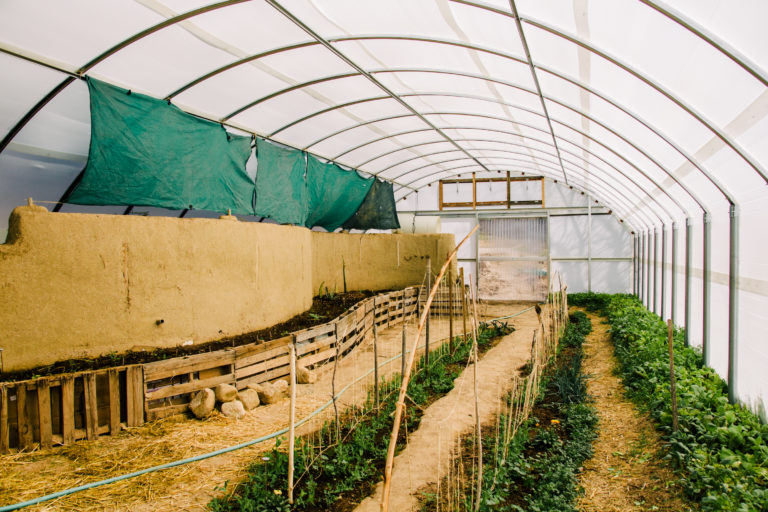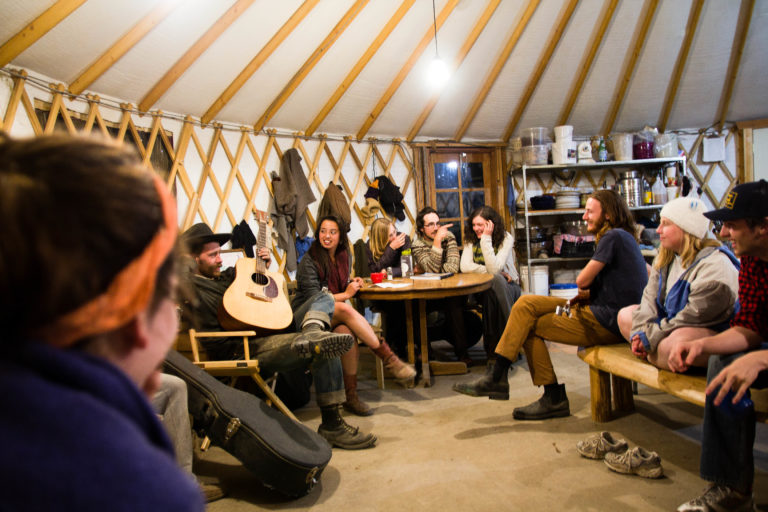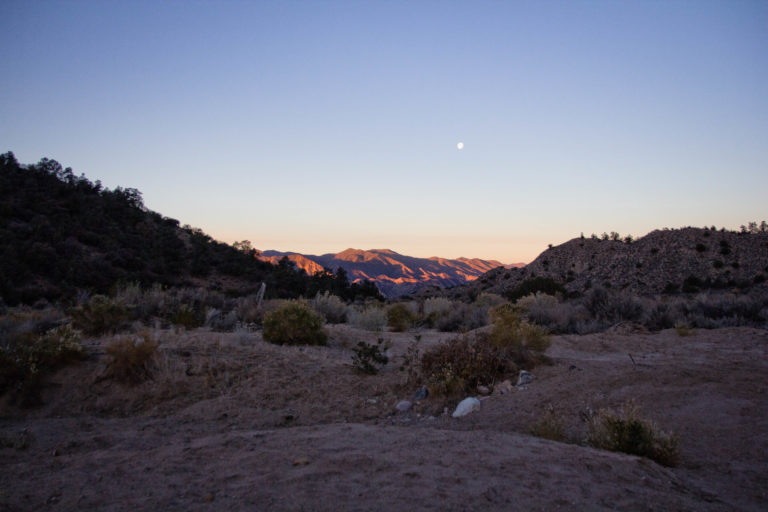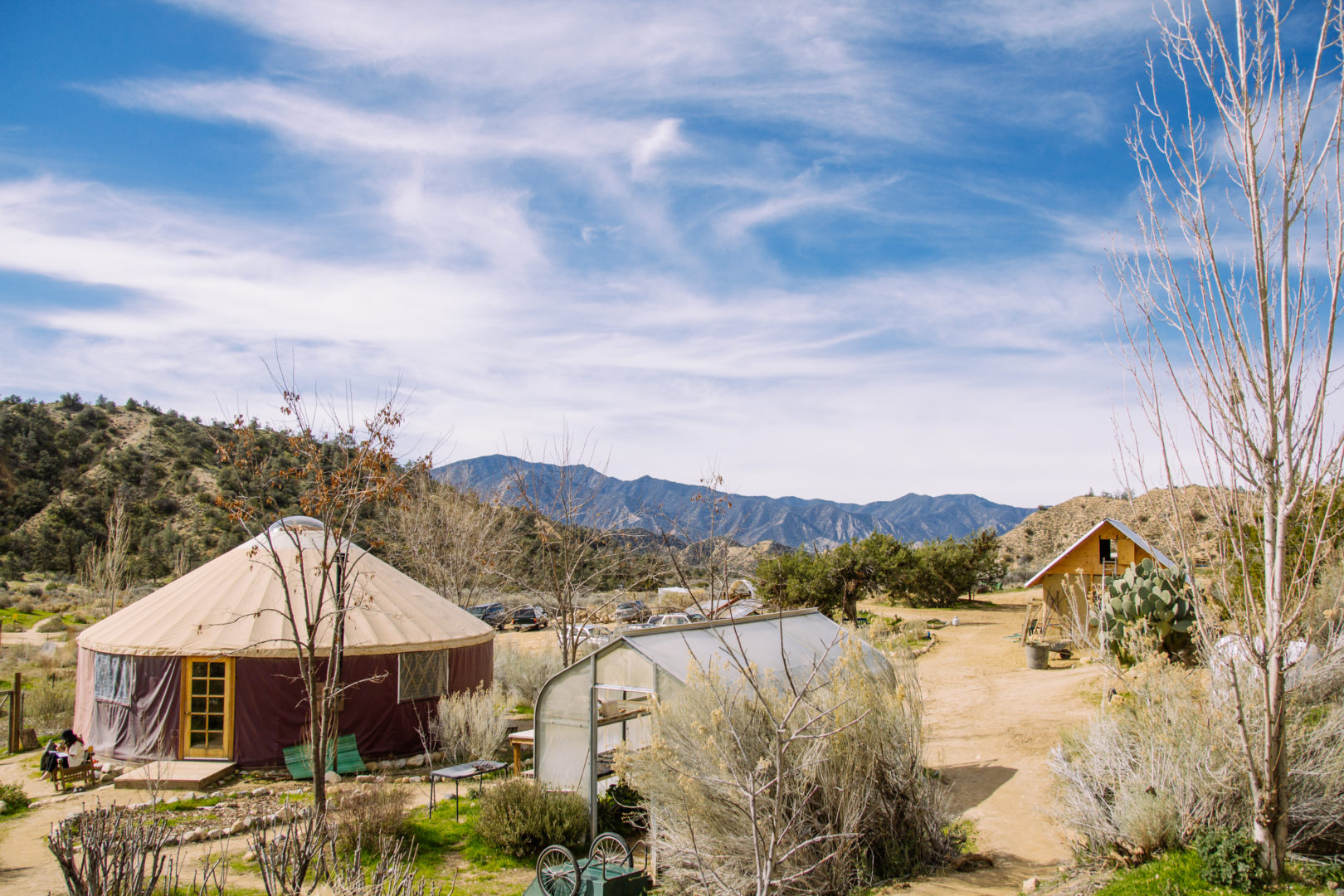A California nonprofit teaches sustainable ways of living to students, artists, gardeners, and whomever else lusts to learn from the land.
Story and images by Rita Kovtun
Five years ago, Danielle Brehmer quit her day job as a medical secretary at Mayo Clinic in Rochester, Minn., sold her belongings, and headed west to California with her partner Ryan Spaulding to discover healthy and sustainable ways of living.
“A lot of the things within our economic system and system at large were troubling me. Our economic system pushes us to prioritize profit over all else—including human and environmental well-being. I felt like there’s got to be a different way,” Brehmer says. She and Spaulding visited a dozen farms and sites before heading off to the high desert mountains for a natural building internship at a place called Quail Springs Permaculture. They planned to stay a few months; they ended up staying four years.
“There was something special about this place that kept us here,” Brehmer says.
Quail Springs is nestled in the watershed of Mt. Pinos and Mt. Abel, occupying 450 acres of the Pinyon-Juniper woodlands of the upper Cuyama Valley—land that has been sacred to the native Chumash people for thousands of years. The organization was officially established in 2004, evolving out of the educational nonprofit the Wilderness Youth Project after co-founders Warren Brush, Cyndi Harvan, Kolmi Majumdar, and Paul Swenson realized that nature immersion and our relationship with the land are crucial for human—especially children’s—well-being.
“It’s not only a growing and developing community, it’s also an educational and demonstrational site and a nonprofit organization all wrapped up into one,” Brehmer (nicknamed “Willow” by the Quail Springs community) says. “I think the unique landscape and how remote and quiet it is out here—that combined with the aspect of community—creates a transformational experience for a lot of people who come here.”
Today, a small community of permanent and transient residents live on and care for the land as well as teach courses ranging from permaculture design, to hide tanning, to natural building. The organization aims to teach holistic ways of creating human spaces and “to facilitate deeper understandings of ourselves and one another through immersive experiences in nature.”
While most people are aware of what “sustainability” means, “permaculture” is still relatively unknown outside of certain circles, though the two are related. Coined by biologists Bill Mollison and David Holmgren in the 1970s, the word comes from the expression “permanent agriculture.” At its core, permaculture is a design methodology that aims to create systems that are as resilient and efficient as those found in nature. The practice is about regeneration—not just sustainability. Permaculturists follow three core ethics: earth care, people care, and fair share, as well as 12 design principles. Quail Springs is one of many places that offers courses for the internationally recognized Permaculture Design Certificate, which arms graduates with a solid foundation to practice permaculture on their own or in a career.



BEHIND THE SCENES
The permanent team at Quail Springs is small, fluctuating at around 15 members. People come and go, leaving the farm to teach courses in other states or countries, visit family, or simply travel. Everyone has a role—managing the farm, coordinating programs, writing newsletter updates—and a few volunteers and work traders are usually around to help as well.
The Quail Springs farm—with the help of goats, chickens, ducks, and rabbits—produces the majority of the milk, meat, and eggs consumed by staff and course participants, while the gardens and greenhouse grow an assortment of vegetables. However, the amount they produce isn’t enough to feed everyone for every meal, and so they work with local farmers and a local co-op to ethically source additional vegetables, fruits, oils, honey, grains, beans, and dry goods.
As a nonprofit, Quail Springs is funded through course income, individual contributions, foundations, and grants. Core staff in administration, facilities, outreach, and farm management receive stipends, room, board, and the potential for teaching courses or creating organization/community supported entrepreneurial businesses at Quail Springs. The organization is in the midst of a capital campaign to raise $400,000 to buy the Quail Springs land. The Zannon Family Foundation assisted Quail Springs with the original purchase of the land with a generous, 12-year no interest loan.

A CHANGE IN PERSPECTIVE
Youth development has been an important aspect of Quail Springs since its inception. The community takes an active role in mentoring the next generation, understanding that permaculture is not only about redesigning the physical landscape but also the human one.
Aside from its summer Sustainable Vocations program aimed at youth ages 15 to 19, Quail Springs also regularly hosts school groups including an annual group from the University of St. Thomas in Minnesota. This was how I first discovered the farm on a 10-day service trip in January 2014.
Crossing over from an especially miserable Minnesota winter (the one that included the memorable “polar vortex”) into warm, sunny California was uplifting in itself, but the lessons learned in that short period at Quail Springs transformed my worldview. Through hikes up the watershed, witnessing ethical poultry butcherings, pine needle basket weaving, gratitude circles, and afternoons plastering small houses with cob (a mixture of earthen materials), our group was initiated into the world of permaculture. We learned firsthand how everything was connected—taking the goats for a walk so they could feed off the land led to milking them, which led to making and consuming yogurt and cheese, which led to using the compost toilet so that those nutrients went back into the land and helped grow new plants and feed for the goats. We learned that change starts with us.
This is at the crux of the Quail Springs experience—change has to happen on a personal level before it can happen on a communal, national, and international scale.

The members of Quail Springs aim to create change that is healing—using permaculture to not only slow, but also to reverse the effects of climate change. In the last 12 years, the tending and restoration efforts of the Quail Springs community brought back a rare desert spring from near extinction to resilience and health. The community is also guided by a 200-year vision that takes into consideration the next seven generations that will live on the land.

DIVERSE LEADERSHIP
This important progress has not been made without a balanced team. Women hold the majority of leadership positions on the farm and make up 50 percent of Quail Springs’ board of directors.
“It’s important to have as much perspective and information as we move forward together as possible,” says Jan Smith, one of the pillars of the Quail Springs community. “Perspective and capacity come from broad and diverse representation of gender, sexual orientation, social experience, religious belief, political belief, heritage, life stage, experience, and opinion.”
Smith and her husband Brenton Kelly have been involved with the organization since its beginning and came on as full-time resident farm managers and land stewards in 2008. Smith is also an artist-in-residence at Quail Springs. Since living and working at the farm, she’s recorded an album of original songs and joined other residents to front the band Cuyama Mama & the Hot Flashes, of which Brehmer and Spaulding are also members.
“Music, writing, and performance is where I come alive and feel fed,” she says. “As a community, music is one of the valuable ways we join together in celebrating and honoring our experiences of being human.”

PUTTING PERMACULTURE INTO PRACTICE
At a time when the current U.S. administration vehemently denies climate change, announces intent to withdraw the country from the Paris Climate Agreement, and, most recently, attempts to police the work of nonpartisan academics to remove references to phrases like “global warming” in their work, the need for earth care, people care, and fair share is more crucial than ever before. And while it may seem daunting to practice permaculture in a city rather than a farm, it is possible.

“There might be some limitations, but I think there’s also a lot of possibilities,” Brehmer says. “One way is […] looking at what your needs and desires are, such as looking at the basics of food, shelter, water, and transportation, and [asking] […] ‘What changes can I make in my life that could embrace permaculture ethics?’ I notice whenever I go to a city it seems like the main things I do are spend money and generate some sort of waste. So thinking of ways to create [and] support alternatives and reduce waste and consumption is a good place to start.”
It’s easy to get overwhelmed, but an incremental lifestyle change can make a difference, as can self-evaluation. “Every organism has a niche or role. What could your role be in all this?” Brehmer says.
There are small ways to incorporate the ethics of permaculture into a city lifestyle such as starting or joining a garden; choosing to bike or use public transportation; bringing containers to grocery stores when buying in bulk to reduce packaging waste; composting, either personally or via a workspace; voting with your dollar by supporting local businesses; and researching nearby farms and visiting them to better understand where local food comes from and who the people are behind the production.
Brehmer herself recently left Quail Springs and returned home to Minnesota. While at the farm, she discovered a passion for gardening she hadn’t known before and also served on the farm’s class catering and animal care teams. Among the things she took back with her is a renewed sense of hope.
“I can’t say I was very hopeful about the future before Quail Springs, but the quantity of people who come here and are changed by this place—they care about what’s going on the world. I feel like that has been uplifting and a good change of perspective in my life.”


Rita Kovtun is a Minneapolis-based writer and photographer. Crafting stories that center on shared human experiences, she aims to shift perspectives and expand world views. Born in Russia, raised in the United States, and having spent extended time studying in France and volunteering in Costa Rica, Kovtun brings a global context to her work. See more at ritakovtun.com and follow her on Instagram @ritakovtun.




